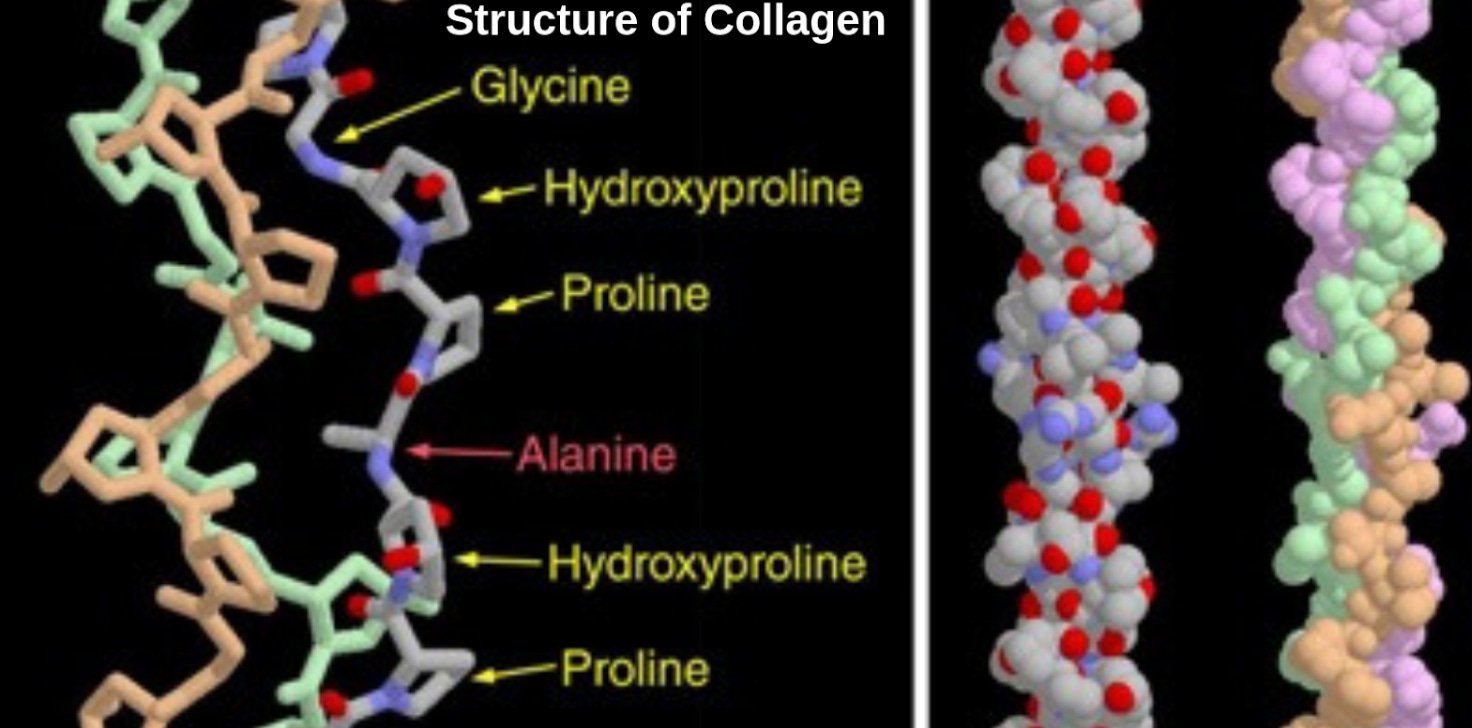Well being - The Importance of Collagen
Update on Collagen science and clinical research-demonstrated health benefits
Jill and I are big believers in vitamins, minerals and supplements. One of the reasons we add these items to our health regime is that as people age, the gut becomes less efficient at absorption. Another reason is that the nutrient profile in commercial crops has deteriorated over time. This is because soil has become depleted of sulphur, phosphorus, macro and micro-nutrients as well as bacteria (including the B vitamins) due to intensive farming, intensive petro-based fertilization, and use of herbicides such as glyphosate. Fertilizers are used to supplements the soil to obtain maximal harvest but they do not add much to enrich the soil. Various studies have concluded that magnesium, protein, calcium, vitamin C, magnesium, phosphorus, riboflavin, and iron are a few of the nutrients that have decreased in various plant crops over the past 50+ years (1-6), and these are just the nutrient levels that have been historically tested!
Even differences in livestock feed can have a huge impact on nutritional value. For instance, grass fed beef has been shown to be much higher in omega-3 fatty acids and has a significantly different lipid profile from feed-lot beef (7).
Which brings me to why taking collagen is worth considering. Collagen is a structural protein that is found in the muscles, skin, tendons, ligaments, cartilage, bone and connective tissues. There are many different types of collagen, but types I, II, and III make up 80% to 90% of all collagen in the human body.
There are clinical trials to support using nutritional collagen both as an oral supplement and as a topical. But interestingly, not all types of collagen are equal as supplements.
Caveat: There is no such thing as “vegan collagen” or “plant-based collagen.” Products labelled as such contain ingredients such as vitamin C and botanicals meant to boost the production of collagen in the body. Moreover, there is a lack of evidence showing that these products actually work as advertised.
These are NOT collagen -
Another related product to collagen is Gelatin, which is purified by the partial hydrolysis of collagen, is not soluble in water and has limited medical use. Therefore, there is little reason to write about it here, except to note that gelatin (like “plant-based collagen”) is also not an adequate substitute for collagen.
Collagen peptides are created by enzymatic degradation of gelatin. This produces shorter peptides that are soluble in water and do not form a gel. Collagen peptides are also known as hydrolyzed collagen or collagen hydrolysate. This is what the majority of collagen supplement products available on the market consist of.
When taken orally, collagen peptides are up to 90% absorbed and are distributed to a variety of target organs, including the dermis, muscle, bone, liver, kidney, and brain. It is believed that higher concentrations of these peptides at target locations will increase the production of collagen at those sites (8).
Jill and I consume a hydrolyzed grass-fed collagen peptide supplement that contains types I, II and III, which we take twice daily, and Jill also uses a cream that contains collagen peptides in her daily skin care regime. But we don’t recommend any particular brand, except to say “buy American made”. We are not in the business of selling vitamins and supplements- we are merely informed consumers, similar to most of you.
High-quality products will have a third-party quality certification stamp. The National Sanitation Foundation (NSF) certifies collagen products through its NSF Certified for Sport program. For a product to obtain this stamp, the manufacturer must pass an inspection for Good Manufacturing Practices (GMP) every six months. Additionally, the product that carries this stamp is subject to random off-the-shelf testing that confirms the quality of the product. These products can be identified by the stamp on the product label. <Sounds more rigorous than the COVID genetic vaccine testing!>
There have been clinical trials testing the effectiveness and safety of Collagen I,II and III as well as collagen peptides, and much of the research has been focused on joint and skin health. In our opinion, the available clinical research suggests that certain forms of collagen provide benefit for knee osteoarthritis, joint health and skin rejuvenation (wrinkle reduction).
“Collagen Supplementation for Joint Health: The Link between Composition and Scientific Knowledge” is an extensive review of up-to-date data concerning collagen supplementation for joint health. I recommend it as required reading for anyone who wishes to know more on the subject. This review shows clear benefit of collagen supplementation for osteoarthritis and joint health.
Nutrients. 2023 Mar; 15(6): 1332. Published online 2023 Mar 8. doi: 10.3390/nu15061332
Collagen Supplementation for Joint Health: The Link between Composition and Scientific Knowledge
Nutrients. 2023 Mar; 15(6): 1332. Published online 2023 Mar 8. doi: 10.3390/nu15061332
In the studies evaluating the use of hydrolyzed collagens for OA, huge variability can be found as different designs, comparators, dosages, administration patterns (either alone or in combination), origins, and study durations are used, making it difficult to draw overall conclusions.
Despite huge methodological differences, all studies reported, at least, partially positive results on the evaluated outcomes. Parameters showing most positive results in these trials are related to the self-reported improvement of OA symptomatology including function, quality of life, and pain. Although most of the studies report improvements in pain and function, the daily dose is highly variable. Bernardo et al. [101] in a randomized single-blind study reported improvements in joint pain and function after 6 months of administration of 1.2 g/day of a hydrolyzed collagen ingredient. Using another hydrolyzed collagen, Benito-Ruiz et al. [100] also demonstrated improvements in joint pain and function after 6 months of administration, but with a dose of 10 g/day in a randomized double-blind placebo-controlled study. Besides daily dose, there is also high variability in administration time. Trč and Bohmová [104] in a double-blind study reported improvements in joint pain and function compared to a treatment with GS (1.5 g/day) as a result of the administration of 10 g/day of an hydrolyzed collagen for 3 months, while Kilinc et al. [105] in an observational study reported symptomatic improvements compared to baseline with another hydrolyzed collagen administrated for two weeks at a dose of 720 mg/day followed by two additional weeks at a dose of 360 mg/day.
Besides improvements in pain and function, changes in cartilage degradation have also been detected. In 2011, McAlindon et al. [99] reported an increase in proteoglycan content in knee cartilage after 24 weeks of treatment with 10 g/day of a specific hydrolyzed collagen formulation.
Studies evaluating the effects of hydrolyzed collagens in non-OA patients have obtained mixed results. Two randomized double-blind placebo-controlled studies reported improvements in activity-related joint pain after 6 months of administration of a hydrolyzed collagen from porcine origin at a dose of 10 g/day in one study [112] and 5 g/day in the other [111]. However, in another randomized double-blind placebo-controlled study, no differences in join pain and function were detected after 3 months of administration of 10 g/day of a hydrolyzed collagen from bovine origin [113].
References in the above section are listed at the bottom of the Substack (9-23).
A recent study documented that hydrolyzed collagen II improved joint pain as well as joint, muscle, and bone functions among older adults with Osteoarthritis (OA).
Randomized, double-blind, four-arm pilot study on the effects of chicken essence and type II collagen hydrolysate on joint, bone, and muscle functions
Randomized Controlled Trial Nutr J, 2023 Mar 15;22(1):17. doi: 10.1186/s12937-023-00837-w.
Methods: Patients (n = 160) with grade 1-3 knee OA according to the Kellgren-Lawrence classification system, joint pain for ≥ 3 months, and a Western Ontario and McMaster Universities Osteoarthritis Index (WOMAC) score of > 6 were randomly assigned with equal probability to consume EC-HC-II, HC-II, glucosamine HCl, or a placebo for 24 weeks in combination with resistance training. Outcome measurements were WOMAC score, visual analogue scale (VAS) pain score, grip strength, fat-free mass (FFM), and bone mass.
Results: All groups exhibited similar levels of improvement in WOMAC index scores after 24 weeks. HC-II significantly reduced VAS pain score by 0.9 ± 1.89 (p = 0.034) after 14 days. A repeated-measures analysis of variance showed that HC-II reduced pain levels more than the placebo did (mean ± standard error: - 1.3 ± 0.45, p = 0.021) after 14 days; the EC-HC-II group also had significantly higher FFM than the glucosamine HCl (p = 0.02) and placebo (p = 0.017) groups and significantly higher grip strength than the glucosamine HCl group (p = 0.002) at 24 weeks.
Conclusion: HC-II reduces pain, and EC-HC-II may improve FFM and muscle strength. This suggests that EC-HC-II may be a novel holistic solution for mobility by improving joint, muscle, and bone health among older adults. Large-scale studies should be conducted to validate these findings.
Finally, a 2023 meta-analysis on using hydrolyzed collagen (HC) supplementation on skin hydration and elasticity found significant benefit to skin health.
Effects of Oral Collagen for Skin Anti-Aging: A Systematic Review and Meta-Analysis
Nutrients, 2023 Apr 26;15(9):2080. doi: 10.3390/nu15092080. PMID: 37432180, DOI: 10.3390/nu15092080
Abstract: This paper presents a systematic review and meta-analysis of 26 randomized controlled trials (RCTs) involving 1721 patients to assess the effects of hydrolyzed collagen (HC) supplementation on skin hydration and elasticity. The results showed that HC supplementation significantly improved skin hydration (test for overall effect: Z = 4.94, p < 0.00001) and elasticity (test for overall effect: Z = 4.49, p < 0.00001) compared to the placebo group. Subgroup analyses demonstrated that the effects of HC supplementation on skin hydration varied based on the source of collagen and the duration of supplementation. However, there were no significant differences in the effects of different sources (p = 0.21) of collagen or corresponding measurements (p = 0.06) on skin elasticity. The study also identified several biases in the included RCTs. Overall, the findings suggest that HC supplementation can have positive effects on skin health, but further large-scale randomized control trials are necessary to confirm these findings.




